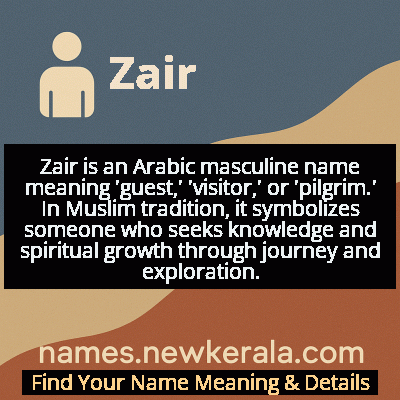Zair Name Meaning & Details
Origin, Popularity, Numerology Analysis & Name Meaning of Zair
Discover the origin, meaning, and cultural significance of the name ZAIR. Delve into its historical roots and explore the lasting impact it has had on communities and traditions.
Name
Zair
Gender
Male
Origin
Muslim
Lucky Number
9
Meaning of the Name - Zair
Zair is an Arabic masculine name meaning 'guest,' 'visitor,' or 'pilgrim.' In Muslim tradition, it symbolizes someone who seeks knowledge and spiritual growth through journey and exploration.
Zair - Complete Numerology Analysis
Your Numerology Number
Based on Pythagorean Numerology System
Ruling Planet
Mars
Positive Nature
Generous, passionate, energetic, and humanitarian.
Negative Traits
Impulsive, impatient, moody, and can be overly emotional.
Lucky Colours
Red, maroon, scarlet.
Lucky Days
Tuesday.
Lucky Stones
Red coral, garnet.
Harmony Numbers
1, 2, 3, 6.
Best Suited Professions
Military, sports, philanthropy, leadership roles.
What People Like About You
Courage, energy, leadership, generosity.
Famous People Named Zair
Zair Shah
Religious Scholar
Prominent Islamic scholar and teacher in South Asia
Zair Ahmed
Businessman
Successful entrepreneur in the Middle East
Zair Hassan
Academic
Professor of Islamic Studies at international universities
Name Variations & International Equivalents
Click on blue names to explore their detailed meanings. Gray names with will be available soon.
Cultural & Historical Significance
Historically, the name has been used to signify someone who is a seeker of knowledge or spiritual truth, reflecting the Islamic emphasis on continuous learning and spiritual growth. In many Muslim societies, names with such meaningful roots are chosen to instill specific values and characteristics in children from birth. The name also connects to the tradition of visiting scholars and saints, where a 'zair' would travel to seek knowledge from learned teachers, making it particularly meaningful in educational and religious contexts.
Extended Personality Analysis
Individuals named Zair are often perceived as curious, open-minded, and spiritually inclined. They tend to possess a natural wanderlust and intellectual curiosity that drives them to explore new ideas, places, and perspectives. This inherent quality of being a 'visitor' or 'seeker' manifests in their personality as adaptability, cultural sensitivity, and the ability to connect with diverse people. They are typically excellent communicators who can bridge cultural gaps and make others feel comfortable.
Zairs often demonstrate remarkable emotional intelligence, showing empathy and understanding toward others' experiences. Their pilgrim-like nature makes them reflective individuals who value deep connections over superficial relationships. They are often seen as wise beyond their years, carrying an air of quiet contemplation and spiritual depth that draws others to them for guidance and counsel. However, this constant seeking can sometimes lead to restlessness or difficulty settling into routines, as they may always feel there's more to discover and experience in life.
Modern Usage & Popularity
In contemporary times, Zair maintains moderate popularity in Muslim communities worldwide, particularly in Arabic-speaking countries, Pakistan, and Muslim diaspora communities. While not among the most common Muslim names, it enjoys steady usage among parents seeking traditional yet distinctive names with deep spiritual meaning. The name has seen a slight resurgence in recent years as younger Muslim parents look for names that connect to Islamic heritage while remaining unique. It's particularly popular among educated, urban Muslim families who appreciate its sophisticated sound and meaningful connotations. The name crosses cultural boundaries well, making it suitable for Muslims living in Western countries who want a name that's easily pronounceable yet culturally significant. Social media and global connectivity have also helped maintain the name's relevance across different generations.
Symbolic & Spiritual Meanings
Symbolically, Zair represents the human journey through life as a temporary visitor on Earth, echoing the Islamic concept of dunya (worldly life) as a transient abode. The name embodies the metaphor of life as a pilgrimage toward spiritual enlightenment and ultimate return to the Divine. It symbolizes the seeker's path - someone constantly moving toward higher understanding and deeper connection with God. The guest symbolism extends to representing humility and the recognition that all possessions and positions are temporary loans from God. In Sufi traditions particularly, the name carries connotations of the spiritual traveler (salik) who journeys through various stations of spiritual development toward divine proximity. It also symbolizes cultural bridge-building and the exchange of knowledge across boundaries, representing someone who carries wisdom from their journeys to share with others.

